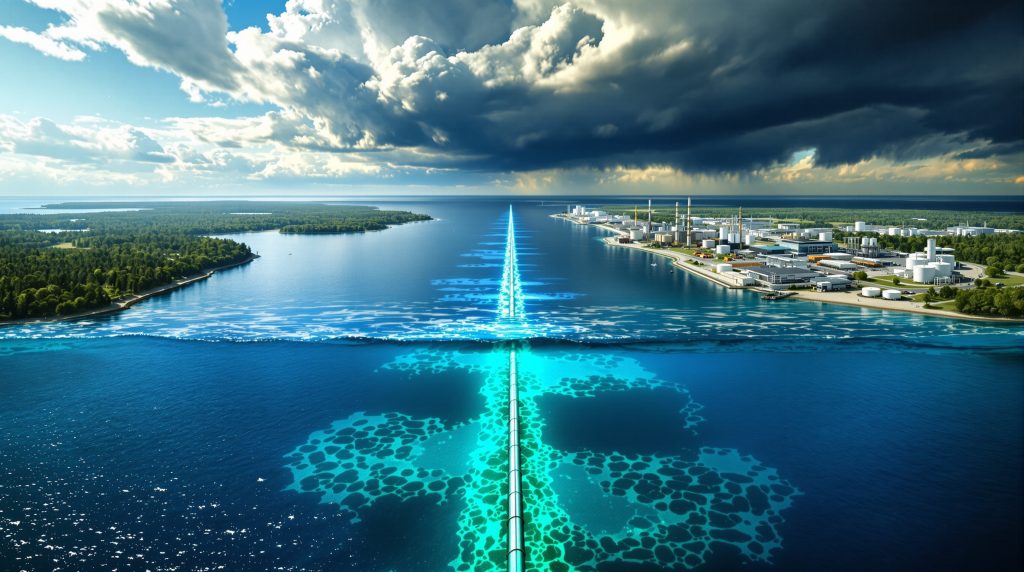Michigan Pipeline Legal Battle: Environmental Protection vs. Energy Security
The Enbridge Line 5 pipeline has become the center of a complex legal battle in Michigan, where environmental concerns clash with energy security needs. Built in 1953, this 645-mile pipeline transports approximately 540,000 barrels of crude oil and natural gas liquids daily from Superior, Wisconsin, through Michigan to Sarnia, Ontario. The most contentious section runs beneath the Straits of Mackinac, where Lake Michigan meets Lake Huron.
The pipeline's underwater segment has drawn particular scrutiny from environmental groups, indigenous communities, and state officials concerned about the potential impact of a spill on the Great Lakes ecosystem.
What Makes the Michigan Pipeline Case So Significant?
The Line 5 controversy represents more than just a local dispute—it embodies the tension between fossil fuel infrastructure and environmental protection. The pipeline's underwater segment poses potential risks to the Great Lakes, which contain 20% of the world's fresh surface water and 84% of North America's surface freshwater.
Meanwhile, the pipeline supplies essential energy products to Michigan's Upper Peninsula and serves as a critical link in the energy relationship between the United States and Canada, creating a complex web of economic dependencies alongside environmental concerns.
How Did the Legal Battle Begin?
The Evolution of Michigan's Pipeline Concerns
In 2010, another Enbridge pipeline (Line 6B) ruptured near Marshall, Michigan, spilling over 840,000 gallons of oil into the Kalamazoo River. This environmental disaster became one of the largest inland oil spills in U.S. history and cost more than $1.2 billion to clean up. The incident raised serious questions about the safety of aging pipeline infrastructure, particularly Line 5's underwater crossing.
Environmental assessments conducted by the University of Michigan revealed that a spill in the Straits of Mackinac could impact over 700 miles of shoreline due to the complex currents in the area. Economic impact studies estimated that a catastrophic spill could cause between $1.9 billion and $6.3 billion in damages to natural resources, property, and the regional economy.
Initial Legal Challenges to Line 5
The legal confrontation intensified in 2019 when Michigan's Attorney General Dana Nessel filed a lawsuit arguing that Enbridge's continued operation violated:
- The public trust doctrine, which requires the state to protect public waterways
- Michigan environmental protection laws
- Public nuisance regulations
This action sought to permanently decommission the pipeline following proper notice periods, citing concerns about the integrity of the aging infrastructure.
What Role Do Tribal Nations Play in the Pipeline Battle?
Treaty Rights and Environmental Justice
The Bay Mills Indian Community, along with other Tribal Nations including the Grand Traverse Band of Ottawa and Chippewa Indians, the Little Traverse Bay Bands of Odawa Indians, and the Sault Ste. Marie Tribe of Chippewa Indians, has taken a leading role in challenging the pipeline's continued operation. Their legal arguments center on:
- Treaty-protected fishing rights in the Great Lakes dating back to 1836
- Cultural and spiritual connections to the waters of the Great Lakes
- Environmental justice concerns for indigenous communities who depend on the lakes for subsistence
In 2019, the Bay Mills Tribal Council formally adopted a resolution opposing Line 5, marking the first time the tribe had taken such a position against infrastructure threatening their treaty waters.
Tribal Legal Interventions
Tribal Nations have intervened in multiple legal proceedings:
- Challenging permits issued by the Michigan Public Service Commission
- Participating in federal court cases regarding jurisdiction
- Providing testimony about potential impacts on treaty-protected resources
- Filing amicus briefs highlighting indigenous perspectives on water protection
Their involvement has added constitutional and treaty rights dimensions to what might otherwise be viewed as solely an environmental regulatory dispute, raising important questions about the nation's obligations to honor historical agreements with indigenous peoples.
What Solutions Has Enbridge Proposed?
The Great Lakes Tunnel Project
Enbridge has proposed constructing a $500 million concrete-lined tunnel beneath the Straits of Mackinac to house a replacement section of Line 5. According to the company, this would:
- Virtually eliminate the risk of a spill by protecting the pipeline from anchor strikes
- Allow continued operation for another 99 years
- Maintain energy supplies to regional markets
- Create jobs and economic benefits during construction
The Michigan Public Service Commission approved permits for this tunnel project in 2023, but these approvals have been challenged in court by environmental groups and Tribal Nations who argue that alternative solutions weren't adequately considered.
Safety Measures and Monitoring
While pursuing the tunnel solution, Enbridge has implemented enhanced safety protocols including:
- Regular underwater inspections using autonomous vehicles and divers
- Automatic shut-off systems that can detect pressure changes
- Improved emergency response capabilities stationed near the Straits
- Weather-based operational restrictions during high waves or currents
The company maintains these measures adequately protect the Great Lakes while the tunnel project advances, though critics argue these measures are insufficient given the age of the infrastructure and the sensitivity of the ecosystem.
What Are the Key Legal Questions in the Michigan Supreme Court Case?
The Michigan Supreme Court agreed in 2025 to hear challenges related to the tunnel permit approvals. The case centers on several critical questions:
-
Did regulators properly consider environmental impacts under Michigan's Environmental Protection Act, which requires evaluation of alternatives that would minimize environmental harm?
-
Were Tribal treaty rights adequately addressed in the permitting process insights, and does the state have obligations to protect these rights?
-
Should alternative solutions, including pipeline decommissioning or rerouting, have received more consideration?
-
Does the Public Service Commission have authority to approve infrastructure with a 99-year lifespan given changing energy needs and climate policies?
The court's decision could significantly impact not just Line 5 but how infrastructure projects affecting shared natural resources are evaluated throughout the region. It may establish precedent for how indigenous rights factor into major infrastructure decisions.
How Has Federal Involvement Complicated the Case?
The International Relations Dimension
The U.S. Justice Department has intervened in the legal proceedings, arguing that:
- Pipeline operations fall under federal jurisdiction, not state control
- The 1977 Transit Pipelines Treaty between the U.S. and Canada protects cross-border energy infrastructure
- Michigan's shutdown efforts could damage international relations with Canada
This federal involvement has transformed a state-level environmental dispute into a case with significant foreign policy implications. The Canadian government has strongly opposed shutdown efforts, invoking the 1977 treaty and suggesting the dispute could damage bilateral relations.
Jurisdictional Questions
A central legal question remains unresolved: does state or federal authority take precedence in regulating the pipeline? The case has moved between state and federal courts, with:
- Michigan seeking to maintain state jurisdiction over waters within its boundaries
- Enbridge arguing for federal oversight under interstate commerce laws
- The U.S. government supporting federal primacy based on international treaty obligations
These jurisdictional questions could ultimately reach the U.S. Supreme Court, which would need to balance state environmental protection powers against federal authority over interstate commerce and international relations.
What Are the Economic Stakes in the Pipeline Dispute?
Regional Energy Supply Concerns
Line 5 supporters emphasize its economic importance:
- Supplies 65% of propane used in Michigan's Upper Peninsula, heating homes in a region with harsh winters
- Provides feedstock to refineries in Detroit, Toledo, and Sarnia
- Supports thousands of direct and indirect jobs in the energy sector
- Transports approximately 540,000 barrels of petroleum products daily
A 2021 economic impact study suggested that closing Line 5 could result in fuel shortages and price increases across the region, with propane prices potentially rising by 10-35% for Upper Peninsula residents.
Alternative Supply Arguments
Pipeline opponents counter that economic concerns are overstated:
- Alternative transportation methods (rail, truck, other pipelines) could replace Line 5
- Renewable energy transitions could reduce dependence on petroleum products
- Short-term economic costs are outweighed by long-term environmental risks
- The economic impact of a potential spill would far exceed transition costs
A 2022 study from Michigan Technological University concluded that propane needs in the Upper Peninsula could be met through alternative delivery systems with minimal disruption if implemented with proper planning and infrastructure investments.
What Environmental Concerns Drive Opposition to Line 5?
Great Lakes Ecosystem Protection
Environmental groups highlight several specific concerns:
- The Great Lakes contain 84% of North America's surface freshwater
- A spill could impact drinking water for millions of people across the region
- The Straits of Mackinac feature complex currents that would complicate cleanup efforts
- The pipeline has experienced anchor strikes and damage in recent years
A University of Michigan study concluded that the Straits represent the "worst possible place" for an oil spill in the Great Lakes due to the powerful and unpredictable currents that could spread contaminants widely across Lakes Michigan and Huron.
Climate Change Considerations
Beyond spill risks, opponents argue that extending the pipeline's life through the tunnel project:
- Locks in fossil fuel infrastructure for another century
- Conflicts with climate change mitigation goals and carbon reduction targets
- Delays transition to renewable energy alternatives
- Contradicts Michigan's carbon reduction commitments
Environmental advocates point out that major infrastructure decisions made today will shape energy usage patterns for decades, making pipeline approval decisions critical to climate policy objectives.
How Has Public Opinion Influenced the Legal Process?
Shifting Political Landscape
Public opinion on Line 5 has significantly influenced Michigan's political approach:
- Governor Gretchen Whitmer campaigned in part on addressing Line 5 concerns
- Environmental groups have mobilized substantial grassroots opposition
- Business and labor organizations have advocated for the pipeline's continued operation
- Native communities have raised awareness about treaty rights implications
These public pressures have shaped both the legal strategies and the political will to pursue the case, with politicians responding to constituent concerns on both sides of the issue.
Media Coverage and Public Understanding
Media coverage has played a crucial role in framing the dispute:
- Technical details about pipeline safety and alternatives have become more accessible
- Economic impact assessments from various perspectives have informed public debate
- Indigenous rights considerations and historical context have gained visibility
- International relations dimensions between the U.S. and Canada have been highlighted
This coverage has helped transform a complex regulatory issue into one with broader public engagement, though different news outlets have emphasized different aspects of the controversy.
What Precedents Could the Michigan Pipeline Case Set?
Implications for Infrastructure Regulation
The ultimate resolution could establish important precedents regarding:
- State authority over interstate and international pipelines
- The weight given to tribal treaty rights in infrastructure decisions
- The balance between immediate energy needs and long-term environmental protection
- How aging infrastructure is evaluated for continued operation or decommissioning
These precedents could influence infrastructure decisions nationwide, particularly for the numerous aging pipelines crossing sensitive ecosystems and waterways.
Climate Policy Implications
The case may also impact how courts and regulators approach fossil fuel infrastructure in an era of climate change:
- Whether climate impacts must be considered in pipeline permitting
- How long-term infrastructure decisions align with climate commitments
- The legal weight of intergenerational environmental concerns
- The balance between energy transition challenges and environmental protection
These broader policy questions extend the significance of the case beyond Michigan's borders, potentially influencing how future infrastructure projects are evaluated across the country.
What's Next in the Michigan Pipeline Legal Battle?
Pending Court Decisions
Several critical legal decisions remain pending:
- The Michigan Supreme Court's ruling on the tunnel permit challenges
- Federal court decisions on jurisdictional questions
- Potential U.S. Supreme Court involvement on treaty and federal preemption issues
- Ongoing litigation regarding the pipeline's current operations
These various legal tracks could converge or diverge in ways that complicate resolution, potentially creating a patchwork of rulings that would need to be reconciled.
Potential Compromise Solutions
Some stakeholders have proposed compromise approaches:
- Temporary continued operation with enhanced safety measures
- Accelerated timeline for tunnel construction
- Alternative pipeline routes that avoid sensitive waterways
- Phased transition to alternative energy transportation methods
Whether these compromise approaches gain traction depends on both legal outcomes and political will, as well as the ability of stakeholders to find common ground amid polarized positions.
FAQ: Michigan Pipeline Legal Battle
How long has Line 5 been operating?
Line 5 has been in operation since 1953, making it over 70 years old. The pipeline was originally designed with an estimated lifespan of 50 years, raising concerns about its structural integrity after decades of use.
What products does Line 5 transport?
Line 5 transports light crude oil, synthetic crude, and natural gas liquids (NGLs), including propane that supplies Michigan's Upper Peninsula for home heating and other essential uses.
Could alternative transportation methods replace Line 5?
Studies have produced conflicting conclusions. Some suggest that rail, truck, and existing pipeline networks could adequately replace Line 5's capacity, while others indicate significant shortfalls and price increases would result. The feasibility depends on implementation timelines and infrastructure investments.
What is the estimated cost of a worst-case spill in the Straits?
Economic impact studies have estimated that a catastrophic spill could cause between $1.9 billion and $6.3 billion in damage to natural resources, property, and the regional economy, with impacts potentially lasting for decades.
How has Canada responded to Michigan's efforts to shut down Line 5?
The Canadian government has strongly opposed shutdown efforts, invoking the 1977 Transit Pipelines Treaty and suggesting the dispute could damage bilateral relations. Canadian officials have participated in court proceedings and diplomatic discussions to advocate for the pipeline's continued operation.
Balancing Competing Priorities
The Michigan pipeline legal battle represents a complex intersection of environmental protection, energy security, tribal sovereignty, and federal-state relations. As courts continue to weigh these competing priorities, the outcome will likely have implications far beyond Michigan's borders.
The case highlights the challenges of managing aging infrastructure in environmentally sensitive areas while meeting ongoing energy needs—a dilemma facing many regions as they navigate mining permit challenges and decarbonisation in mining. It also underscores the importance of honoring treaty obligations with indigenous nations and addressing environmental justice concerns.
Whatever the courts ultimately decide, the Line 5 controversy will likely influence how pipeline projects are evaluated, permitted, and regulated for years to come, setting important precedents for the balance between energy infrastructure and environmental protection. Furthermore, the economic implications extend beyond Michigan, with oil price movements potentially affected by infrastructure decisions across North America.
Ready to Discover the Next Major Mining Opportunity?
Stay ahead of the market with Discovery Alert's proprietary Discovery IQ model, which instantly notifies investors of significant ASX mineral discoveries and transforms complex data into actionable insights. Visit our dedicated discoveries page to understand why major mineral discoveries can lead to exceptional returns and begin your 30-day free trial today.




